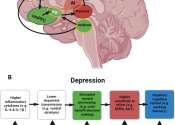Inflammation (Latin, inflamatio, to set on fire) is the complex biological response of vascular tissues to harmful stimuli, such as pathogens, damaged cells, or irritants. It is a protective attempt by the organism to remove the injurious stimuli as well as initiate the healing process for the tissue. Inflammation is not a synonym for infection. Even in cases where inflammation is caused by infection, the two are not synonymous: infection is caused by an exogenous pathogen, while inflammation is the response of the organism to the pathogen.
In the absence of inflammation, wounds and infections would never heal and progressive destruction of the tissue would compromise the survival of the organism. However, an inflammation that runs unchecked can also lead to a host of diseases, such as hay fever, atherosclerosis, and rheumatoid arthritis. It is for that reason that inflammation is normally closely regulated by the body.
Inflammation can be classified as either acute or chronic. Acute inflammation is the initial response of the body to harmful stimuli and is achieved by the increased movement of plasma and leukocytes from the blood into the injured tissues. A cascade of biochemical events propagates and matures the inflammatory response, involving the local vascular system, the immune system, and various cells within the injured tissue. Prolonged inflammation, known as chronic inflammation, leads to a progressive shift in the type of cells which are present at the site of inflammation and is characterised by simultaneous destruction and healing of the tissue from the inflammatory process.









